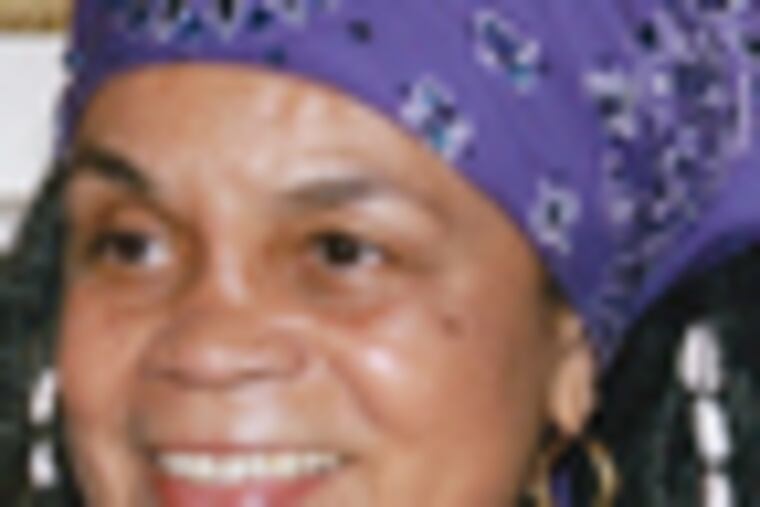Phila. selects Sonia Sanchez as its first poet laureate
For years, people have called her the "unofficial poet laureate of Philadelphia." Now it's official.

For years, people have called her the "unofficial poet laureate of Philadelphia." Now it's official.
Sonia Sanchez, 77, poet, teacher, mentor, activist, and revered Philadelphian, will be named the city's first poet laureate by Mayor Nutter in an 11 a.m. ceremony Thursday at City Hall.
Sanchez is the author of at least 18 books of poetry, as well as plays and children's books. She has long been one of the city's most visible and active writers, readers, teachers, and activists for peace and social equality. Starting in January, she will serve for two years, with a stipend of $2,500 per year.
Contacted at home in West Philadelphia, Sanchez said she had already fielded congratulations from fellow writers Maya Angelou and Toni Morrison.
"People are saying, 'This makes sense, because people have been calling you the unofficial poet laureate for years,' " Sanchez said. "And I say, 'Well, the people are always way ahead of the government.' "
In an official statement, Nutter said he was "extremely excited" by the selection: "Poetry is an extraordinary and powerful art form, and our great city is filled with an astonishing array of poets who help us to better understand our lives. Ms. Sanchez exemplifies the role a poet can play in helping to define a city and helping its citizens discover beauty."
The position was Nutter's idea; he announced the creation of the poet laureate program on May 3, during a Sanchez reading at City Hall.
Surprisingly, for a town of such poetic activity, Philadelphia has never had a poet laureate. Many states do (but not, since 2003, Pennsylvania), as well as dozens of towns (including Harrisburg) and counties (including Bucks and Montgomery).
Over the summer, Nutter charged Gary Steuer, chief cultural officer in the Mayor's Office of Arts, Culture, and the Creative Economy, with assembling a committee to consider candidates and determine the term and duties of the position.
Its members included novelist Lorene Cary (recently appointed to the School Reform Commission); Beth Feldman Brandt, poet and executive director of the Stockton Rush Bartol Foundation; and Gregory Corbin, executive director of the Philadelphia Youth Poetry Movement. "They looked at other cities that had similar positions and how they went about the process," said Moira Baylson, deputy cultural officer.
Siobhan Riordan, president and director of the Free Library of Philadelphia and a member of the selection committee, said, "The mayor really wanted this, and our conversations around Sonia were so easy and so natural. Philadelphia is a city passionate about the things it loves, and she personifies that passion in her poetry and her teaching."
Sanchez moved to Philadelphia from New York in 1976 - "I like to tell people it was 1776," she quips - and soon became prominent in the city's political and artistic life.
Her list of honors, as long as her list of publications, includes a PEN writing award (1969), the National Endowment for the Arts Fellowship Award (1978-1979), and the American Book Award (in 1985, for Homegirls & Handgrenades).
She has also won numerous honors for her civic and community work, and for her teaching. She held the Laura Carnell chair in English at Temple from 1977 to 1999, when she retired; she is currently poet in residence at Temple.
Her poetry reflects many influences, including pop music, the blues, Beat poetry, and Japanese haiku. She is a mesmerizing, rhythmic reader, often credited as a godparent of the contemporary performance poetry movement.
Sanchez' first duty as poet laureate will be to read a poem at Nutter's second inaugural on Jan. 2. She will also select a youth poet laureate, whose term begins in July; she will be that poet's mentor. She will also engage in a variety of civic and community functions.
When her term is up in late 2013, "the position will become competitive," in Baylson's words, "although the details haven't been hashed out quite yet."
Reaction in the poetic community was uniformly delight. Kimmika Williams-Witherspoon, a poet and associate professor of urban theater at Temple and former teaching assistant of Sanchez's, said, "Sonia has always been an icon in the city, and I'm glad the city recognizes the treasure she is. It's a remarkably good choice and may help raise our profile as a literary center."
"That Philadelphia has taken this step, declaring the importance of poetry to civic life and polity, makes me very happy," said Al Filreis, professor of English at the University of Pennsylvania and faculty director of Kelly Writers House who is also a member of the selection committee. "I've lived in the city for 26 years now and have never felt our poetry to be as diversely alive as it is now."
Poet and poetry organizer Leonard Gontarek called Sanchez "a transcendent choice, since she has always spoken to the essential beauty of our city and its citizens. Let poetry occupy Philadelphia! Let it be the universal language of our diversity!"
Sanchez said that for her, "the whole point of accepting this award is on behalf of the people and this wonderful city."
"Philadelphia doesn't realize how wonderful it is."